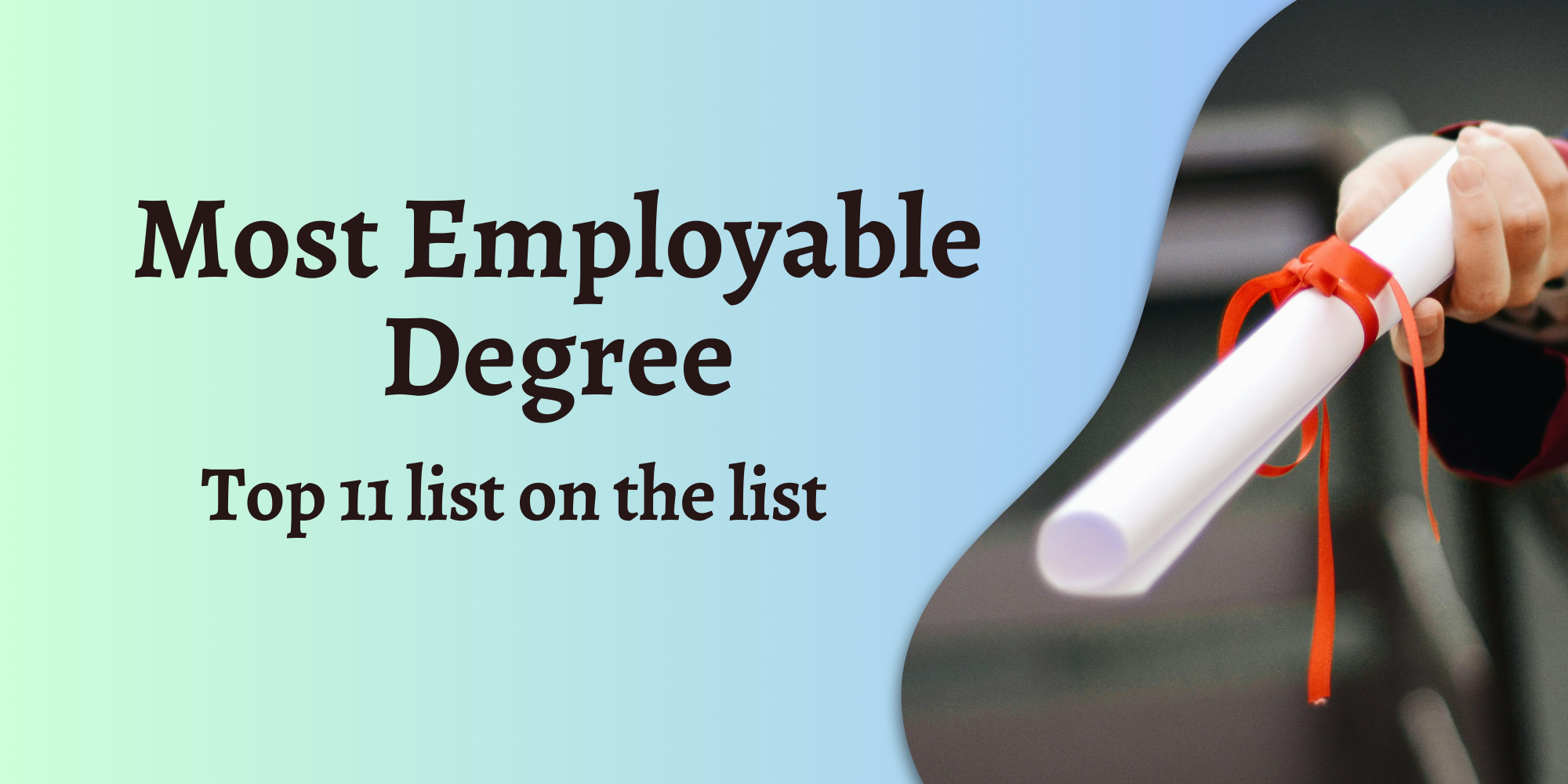There’s more than just your strengths and interests to consider when choosing your degree.
You must choose one that gives you the best chances at landing a job right after graduation – and that’s by pursuing the most employable degrees in Australia.
Employable degrees provide you with in-demand knowledge and skills that Australia needs to address shortages in certain fields.
In this blog, we’ll go through the best degrees to study and the numbers driving their demand. We’ll also look at the expected salary ranges for relevant roles.
1. Nursing
A Bachelor of Nursing degree typically runs around 3 to 4 years.
After which, you’ll be ready to take on roles like:
- Registered Nurse (RN)
- Nurse Manager
- Nurse Practitioner (NP)
- Clinical Nurse Specialist (CNP)
| Studies predict that by 2024, Australia could be short of over 123,000 nurses. |
This is likely due to factors like an ageing population, an ageing healthcare workforce and increased healthcare needs.
With this expected shortage, qualified nurses will likely enjoy job security and find ample job openings in the upcoming years.
To give you an idea of how much a nurse can earn, refer to the table below:
| Role | Annual income (AUD) |
| Nurse (Medical Practice) | 74,325 – 102,664 |
| Registered Nurse (Aged Care) | 79,188 – 130,845 |
| Nurse (Surgical) | 79,591 – 119,808 |
| Nurse (Paediatrics) | 80,680 – 129,306 |
| Nurse (Critical Care and Emergency) | 80,963 – 123,906 |
| Nurse (Community Health) | 81,424 – 129,345 |
| Nurse (Mental Health) | 83,865 – 129,019 |
| Nurse Practitioner | 127,073 – 144,827 |
2. Engineering
A Bachelor of Engineering degree typically runs for 4 years. Popular specialisations are as follows:
- Bachelor of Civil Engineering
- Bachelor of Chemical Engineering
- Bachelor of Industrial Engineering
- Bachelor of Electrical Engineering
- Bachelor of Aeronautical Engineering
- Bachelor of Mechanical Engineering
- Bachelor of Biomedical Engineering
From the report Engineer Shortages and Supply Projections published by the Australian Council of Engineering Deans (ACED), Australia can expect to have a shortage of about 100,000 engineers by 2030, due to factors like retirement and natural attrition.
Furthermore, the report revealed a concerning trend:
| The influx of new engineers is barely keeping pace with the rate at which engineers are leaving the field. |
As the government keeps investing in road and rail upgrades, renewable energy and manufacturing, the demand for engineers will remain high – which is why engineering is also considered one of the top PR courses in Australia.
Refer to the table below for common engineering fields and the expected yearly salary range.
| Field | Annual income (AUD) |
| Biomedical Engineer | 83,592 – 83,592 |
| Chemical Engineer | 85,485 – 200,000 |
| Industrial Engineer | 90,000 – 158,080 |
| Civil Engineer | 92,361 – 155,819 |
| Mechanical Engineer | 92,458 – 160,000 |
| Aeronautical Engineer | 93,317 – 163,436 |
| Electrical Engineer | 100,000 – 160,000 |

3. Computer Science and Information Technology (IT)
Computer Science and IT degrees usually take 3 to 4 years to complete. Employable degrees include:
- Bachelor of Computer Science
- Bachelor of Information Technology (Software Development)
- Bachelor of Information Technology (Business Systems)
- Bachelor of Engineering (Honours) (Software)
- Bachelor of Cyber Security
Gartner’s latest press release reveals that:
| Australia is expected to see more spending in IT, especially in areas like cybersecurity, cloud services and generative AI. |
With more businesses wanting to be more efficient and tackle ongoing data privacy issues, people with qualifications and expertise in computer and IT will be exceptionally valuable.
Below are roles you could pursue and their corresponding salary ranges:
| Roles | Annual income (AUD) |
| Software engineer | 100,000 – 170,476 |
| Systems analyst | 96,809 – 137,622 |
| ICT business analyst | 90,000 – 145,000 |
| ICT security specialist | 90,700 – 136,378 |
| Analyst programmer | 90,899 – 135,223 |
| Developer programmer | 80,000 – 125,000 |
| Software and applications programmers | 88,500 – 105,000 |
| Computer network and systems engineer | 70,000 – 100,000 |
| Ready to study in Australia? Apply for a subclass 500 student visa today! |
4. Education
A degree in Education typically takes around four years to complete full-time. Related education degrees in Australia, include:
- Bachelor of Education (Primary)
- Bachelor of Education (Secondary)
- Bachelor of Early Childhood Education
Based on the Ministers of Education Portfolio’s paper on teacher workforce shortages, enrolments in primary and secondary schools have increased over the years. Furthermore:
| As student numbers are projected to keep increasing, there will likely be a sustained demand for teachers, especially in secondary schools. |
The Australian Government has implemented initiatives to make the teaching profession more appealing to qualified candidates. This includes scholarships, allowances and even job guarantees.
That being said, an education degree is one of the most employable degrees in Australia.
Below’s a list of teacher education roles and their salary ranges:
| Roles | Annual income (AUD) |
| Primary School Teacher | 86,706 – 118,560 |
| Secondary School Teacher | 83,448 – 108,038 |
| Early Childhood (Pre-primary School) Teacher | 75,556 – 95,983 |
5. Accounting
A degree in Accounting takes around three to four years to complete. Several related, employable degrees in this field include:
- Bachelor of Accounting
- Bachelor of Commerce (Accounting)
- Bachelor of Business (Accounting)
- Bachelor of Professional Accounting
Based on the latest statistics, accountants are currently in demand in Australia. In fact:
| “Australia will require 338,362 accountants by 2026 — almost 10,000 extra a year.” |
To address the skills shortage in this profession, the government aims to ease the strict migration policies to bring in more skilled migrants.
This will allow additional professionals to help businesses manage their finances and meet financial goals, alongside the current domestic talent pool.
Below are different accounting roles and their corresponding income potential:
| Roles | Annual income (AUD) |
| Financial Accountant | 95,000 – 127,003 |
| Auditor | 85,000 – 125,041 |
| Tax Accountant | 82,500 – 133,000 |
| Management Accountant | 94,867 – 130,000 |
6. Psychology
Psychology degrees usually take around four years to complete full-time. Related employable degrees include:
- Bachelor of Psychology
- Bachelor of Psychological Science
- Bachelor of Arts (Psychology)
- Bachelor of Science (Psychology)
To become a registered psychologist, you must undertake a further 2+ years of post graduate study (and internship if necessary).
As awareness of mental health grows, there is an increasing demand for mental health services in Australia. In fact, according to a survey conducted by the Australian Psychological Society (APS):
| “Psychologists are overrun with demand and as a result, 1 in 3 psychologists are unable to see new clients…” |
This shows how important and useful a psychology degree can be if you study in Australia.
Below are the different roles you can qualify for and the expected salary ranges.
| Roles | Annual income (AUD) |
| Psychologist | 96,047 – 133,064 |
| Clinical Psychologist | 105,167 – 140,000 |
| Educational Psychologist | 102,500 – 119,131 |
| Organisational Psychologist | 110,798 – 136,344 |
| Psychotherapist | 100,000 – 195,624 |
| Want to stay further and work in Australia after graduation? Apply for a Temporary Graduate 485 visa! |
7. Environmental Studies
A Bachelor’s degree in Environmental Studies typically spans three to four years when pursued full-time. Related degrees include:
- Bachelor of Environmental Science
- Bachelor of Environmental Management
- Bachelor of Environment and Sustainability
- Bachelor of Natural Resource Management
Environmental studies provide you with skills applicable in many fields, including resource management, food production, wildlife conservation, and even business consulting.
| In 2022, Australia allocated a record AUD 25 billion towards advancing clean and renewable energy projects. |
With diverse employment options across industries and the support of this government initiative, you certainly have more opportunities for employment. This makes degrees in environmental studies highly employable in Australia.
Below are the roles you can pursue later on, and the expected salary ranges:
| Roles | Annual income (AUD) |
| Environmental Scientist | 90,000 – 132,194 |
| Environmental Engineer | 90,717 – 146,858 |
| Environmental Consultant | 88,920 – 154,250 |
| Environmental Health Officer | 82,132 – 100,912 |
| Environmental Manager | 104,474 – 157,000 |
| Environmental Research Scientist | 100,000 – 142,891 |

8. Medicine
To become a doctor, you must first complete a bachelor’s degree and take the GAMSAT before applying for a Doctor of Medicine (MD) programme. This can take around seven years. Common bachelor’s degrees for the MD include:
- Bachelor of Medical Laboratory Science
- Bachelor of Medical Studies
- Bachelor of Medical Science
- Bachelor of Science (Medical Science)
- Bachelor of Science (Biomedical Science)
- Bachelor of Nursing
- Bachelor of Health Science
With Australia’s growing population comes the need for more doctors. While the country generally does well in meeting this demand:
| There remain noticeable shortages in many rural and remote areas. These areas often have too few GPs per 1000 people, indicating a staffing crisis. |
You can find employment opportunities in the various roles below.
| Roles | Annual income (AUD) |
| General Physician | 173,063 – 234,734 |
| Cardiologist | 170,418 – 231,558 |
| Peadiatrician | 191,196 – 220,670 |
| Surgeon | 130,773 – 210,785 |
| Neurologists | 70,000 – 196,837 |
| Dermatologists | 67,184 – 231,558 |
9. Business and Management
Business and management degrees typically take three years to complete. Common employable degrees include:
- Bachelor of Business (Management)
- Bachelor of Applied Finance
- Bachelor of Actuarial Studies
- Bachelor of Business (Marketing)
- Bachelor of Business (Economics)
- Bachelor of Business (Entrepreneurship & Innovation)
With businesses flourishing across various sectors, there’s likely a place for all business professionals in the market.
However, in today’s digital age where businesses are increasingly embracing technology like AI to improve efficiency and productivity, the basics and foundational knowledge you learn in these degrees are even more crucial.
Below are some roles you may qualify for with a business degree, as well as the income range:
| Roles | Annual income (AUD) |
| Management Consultant | 97,638 – 152,100 |
| Business Analyst | 100,000 – 144,384 |
| Marketing Specialist | 75,000 – 112,999 |
| Financial Analyst | 95,000 – 135,000 |
| Actuary | 113,750 – 181,500 |
| Already have a related qualification or work experience? See if you qualify for a general skilled visa. |
10. Pharmacy
Completing a degree in pharmacy typically takes four years. Related degrees you can take include:
- Bachelor of Pharmacy
- Bachelor of Pharmacy and Management
- Bachelor of Pharmaceutical Science
According to projections by Jobs and Skills Australia:
| Employment in this field is expected to increase from 34,600 in 2021 to 37,700 by 2026. This is a growth of 9%, equivalent to 3,100 new jobs. |
With that said, the pharmacy field offers promising opportunities for future pharmacists to enter the workforce and contribute to the healthcare sector’s growth
You can pursue the following roles when you graduate:
| Roles | Annual income (AUD) |
| Hospital Pharmacist | 88,792 – 129,214 |
| Community Pharmacist | 97,670 – 149,188 |
| Industrial Pharmacist | 110,494 – 203,901 |
11. Architecture
Pursuing degrees in architecture full-time can take up to five years. These degrees include:
- Bachelor of Architecture (BArch)
- Bachelor of Architectural Design
- Bachelor of Urban and Regional Planning
A recent report shows that there’s a critical shortage in the architecture workforce. Furthermore, it reveals that:
| Of the 35 listed occupations in the Skills Priority List, 29 are experiencing a national shortage. This includes crucial roles like architects, surveyors, interior designers, urban and regional planners and various engineering categories. |
Especially with Australia expected to focus on clean energy in the coming years, architects with expertise in green and sustainable design will be valuable.
| Roles | Annual income (AUD) |
| Architect | 110,000 – 199,950 |
| Landscape Architect | 86,493 – 122,453 |
| Urban and Regional Planner | 78,472 – 150,000 |
Need migration advice for your studies in Australia?
Whether it’s getting a job or seeking permanent residency, we’ll give you honest and practical advice to lead you to your end goal.
With 10+ years of industry experience, we know how your migration journey will go. We’ll assist you with your visa paperwork, and provide real-time insights, from top institutions to present skills shortages and changes in migration laws.
Book a free call and talk with our registered migration agents today!

